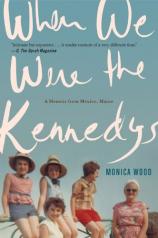Reading Group Guide
Discussion Questions
When We Were the Kennedys

1. The Author’s Note explains that the memoir is the truth as the author recalls it. How does this set the tone for the story? Might you have felt differently about the memoir knowing there were composite characters or rearranged chronologies? Why or why not?
2. On page xix of the Prologue, Monica writes, “In my family, in every family, that story—with its implied happy ending—hinged on a single, beautiful, unbreakable, immutable fact: Dad.” How is this sentiment reinforced throughout the memoir? What other immutable facts do the families of Mexico, Maine hinge on? Describe what happens when these “immutable” facts change.
3. Discuss how the Oxford mill and paper itself often define the lives of the people of Mexico. How do they define even the families and individuals like Albert Wood and Mr. Villaincourt?
4. Shortly after her father’s death, the author recalls her mother’s body feeling “like a gently closed door.” (p. 29) What does she mean by this? What other ways does she use metaphors, turning bodies into objects and objects into bodies, to convey emotion?
5. When Albert Wood dies, Sister Ernestine is teaching the children about explorers. What lessons does Monica glean from these stories? How do they continue to define her education over the summer? Of what does Monica ultimately become an explorer? Identify and discuss some of the mysteries she pursues that summer, and her discoveries.
6. Monica expresses shock as she begins to understand that her father, and all the other fathers, don’t actually own the Oxford—that it isn’t a living thing of which they are all a part, but a company run by other men who can shut off someone’s livelihood with a snap. How else does their father’s death penetrate the innocence of the Wood children’s reality and open up the world to them?
7. On page 95, Monica writes, “It took years for me to see how loss can tighten your grip on the things still possible to hold.” Explain how this observation relates to the Norkuses. Why do they seem so much like foreigners in a town where nearly everyone is multilingual? Compare how the Norkuses have dealt with their losses to the ways in which the Woods struggle in the wake of their loss.
8. Monica seeks to understand her family’s tragedy by comparing them to other families, both real and fictitious. Discuss her attempts. Which family, ultimately, does Monica find that the Woods are most like? Why is this surprising to her?
9. On page 201, Monica writes of her mother, “Her fling with Jackie Kennedy worked magic on us children.” What does she mean by this? How does Mrs. Wood identify with Jackie Kennedy? How do you think this “bond” helps her to move on after Albert’s death?
10. Nearly everyone in Mexico, Maine is Catholic of some variety—Irish, Italian, or French. Discuss the role of Catholicism in this memoir. How does religion influence Monica and her family as they struggle to come back together following Albert’s death?
11. Monica observes many instances of “magic” in When We Were the Kennedys. For example, she describes with awe how logs floating down a river or coming off a train eventually become shiny, slick white Oxford paper. She likewise notes the magical transformation of simple wafers into the body of Christ beneath her uncle’s hands. What other kinds of magic occur throughout the memoir?
12. In Niagara, Margaret Wood chooses the arcade and wax museum as their last day activities. Monica describes inspecting displays about Annie Taylor at the former and Jackie Kennedy at the latter. Discuss the ways in which Margaret might see herself in each woman. What do they all share? What impact does this afternoon have on young Monica?
13. As tensions at the Oxford Paper Company escalate, Monica muses over the words of company president Bill Chisolm: “What will this strike mean to your family?” When she asks her mother, Margaret answers, “Nothing.” But this turns out to be untrue. What, ultimately, does the strike mean to the Woods? What does it mean in the larger picture that is 1960s America?
14. The last line of the book is, “Thank you, I fell the dying beast. I forgive you.” What do you think Monica is thanking the Oxford for? For what do you think she’s forgiving it?
When We Were the Kennedys
- Publication Date: June 11, 2013
- Genres: Fiction
- Paperback: 256 pages
- Publisher: Mariner Books
- ISBN-10: 0544002326
- ISBN-13: 9780544002326








